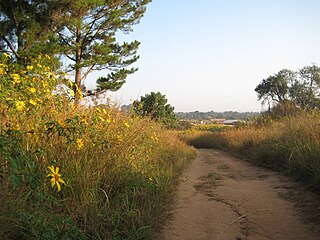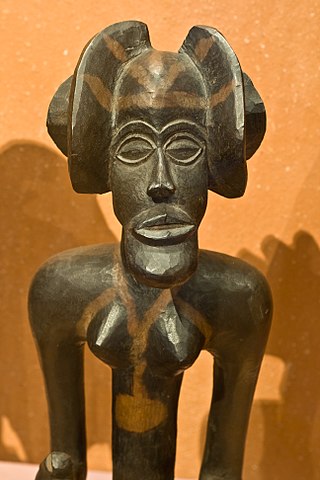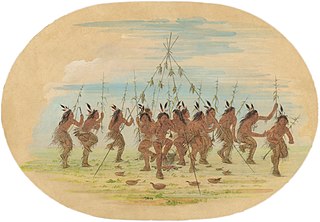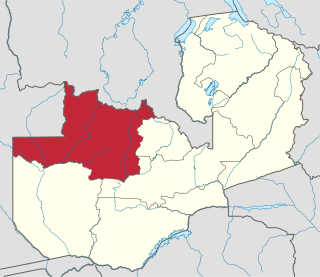Mbunda Lukwakwa Traditional Ceremony is celebrated by the Mbunda under Senior Chief Sikufele, [1] [2] during the first week of October every year at Manyinga of Kabompo District in North Western Zambia.
Contents

Mbunda Lukwakwa Traditional Ceremony is celebrated by the Mbunda under Senior Chief Sikufele, [1] [2] during the first week of October every year at Manyinga of Kabompo District in North Western Zambia.

The ceremony commemorates the Mbunda conquests as they fought alongside the Aluyi in support of Prince Mubukwanu, one of the sons of the Aluyi King Mulambwa. [3] It also gives thanks to their Creator the Almighty God for the blessings on them in providing good harvest the past months according to His Love.
The ceremony is celebrated over three days. On the first day, from late in the evening, all the way throughout the night, men sing and dance at the Mukanda circumcision camp, in preparation for the resurrection of the Makishi from the graveyard early in the morning. On the second day, a Makishi masquerade is performed from the Manyinga grave yard in the east, all the way along the Mutanda Chavuma Road to the Senior Chief's palace, where the Makishi pay homage to the Senior Chief. This is followed up by the Makishi dancing the whole day, followed by traditional entertainment the whole evening and throughout the night.
On the third and climax day, Senior Chief Sikufele makes an appearance to the audience gathered in the main arena, accompanied by Government officials that have come to grace the occasion. The Mbunda Speaking People then perform some rituals in the symbolic Lukwakwa fence erected in the middle of the main arena, signifying their military prowess during their travels and conquests. They also praise their Almighty God by dancing their traditional dances such as Kalukuta, Shombe, Chinjangila, Chisho, Nduko and watching dances performed by their not less than fifty (50) exclusive Mbunda Makithi Artifacts.
Additionally the Mbunda showcase their traditional works such as, Iron Ore smelting, wood carvings, basketry and different kinds of handcrafts which are up for sale immediately after the ceremony.
The Mbunda people value their culture and believe, it is one channel of teaching their offspring to respect the older generation and good dressing manners.

May Day is a European festival of ancient origins marking the beginning of summer, usually celebrated on 1 May, around halfway between the Northern Hemisphere's Spring equinox and June solstice. Festivities may also be held the night before, known as May Eve. Traditions often include gathering wildflowers and green branches, weaving floral garlands, crowning a May Queen, and setting up a Maypole, May Tree or May Bush, around which people dance and sing. Bonfires are also a major part of the festival in some regions. Regional varieties and related traditions include Walpurgis Night in central and northern Europe, the Gaelic festival Beltane, the Welsh festival Calan Mai, and May devotions to the Blessed Virgin Mary. It has also been associated with the ancient Roman festival Floralia.

Zambia, officially the Republic of Zambia, is a landlocked country at the crossroads of Central, Southern and East Africa. It is typically referred to being in South-Central Africa or Southern Africa. It is bordered to the north by the Democratic Republic of the Congo, Tanzania to the north-east, Malawi to the east, Mozambique to the southeast, Zimbabwe and Botswana to the south, Namibia to the southwest, and Angola to the west. The capital city of Zambia is Lusaka, located in the south-central part of Zambia. The population is concentrated mainly around Lusaka in the south and the Copperbelt Province to the north, the core economic hubs of the country.

Midsummer is a celebration of the season of summer, taking place on or near the date of the summer solstice in the Northern Hemisphere; the longest day of the year. The name "midsummer" mainly refers to summer solstice festivals of European origin, especially those in the Nordic countries. In these cultures it is traditionally regarded as the middle of summer, with the season beginning on May Day. Although the summer solstice falls on 20, 21 or 22 June in the Northern Hemisphere, it was traditionally reckoned to fall on 23–24 June in much of Europe. In Christian tradition, these dates coincide with Saint John's Eve and Saint John's Day. It is usually celebrated with outdoor gatherings that include bonfires and feasting.

A promenade dance or promenade, commonly called a prom, is a dance party for high school students. It may be offered in semi-formal black tie or informal suit for boys, and evening gowns for girls. This event is typically held at or near the end of the school year. There may be individual junior and senior proms or they may be combined.

Mwinilunga is a town in the North-Western Province of Zambia. It is the headquarters of Mwinilunga District, one of the province's eleven districts.
Kabompo is a town in north-western Zambia, lying on the Kabompo River with a population over 88,000 people. It is surrounded by teak forest and is home to a Roman Catholic mission. Kabompo was founded in the 1900s or even earlier than that, the district centre was first situated in Nkulwashi before it was moved to its current location. The district boasts of its significance towards its contribution to the nation's food security through Food Reserve Agency (FRA). Even in the late 60's and early 70's Kabompo was very active in agricultural activities through NAMBOARD.

The Chokwe people, known by many other names, are a Bantu ethnic group of Central and Southern Africa. They are found primarily in Angola, southwestern parts of the Democratic Republic of the Congo, and northwestern parts of Zambia.

The Green Corn Ceremony (Busk) is an annual ceremony practiced among various Native American peoples associated with the beginning of the yearly corn harvest. Busk is a term given to the ceremony by white traders, the word being a corruption of the Creek word puskita (pusketv) for "a fast". These ceremonies have been documented ethnographically throughout the North American Eastern Woodlands and Southeastern tribes. Historically, it involved a first fruits rite in which the community would sacrifice the first of the green corn to ensure the rest of the crop would be successful. These Green Corn festivals were practiced widely throughout southern North America by many tribes evidenced in the Mississippian people and throughout the Mississippian Ideological Interaction Sphere. Green Corn festivals are still held today by many different Southeastern Woodland tribes. The Green Corn Ceremony typically occurs in late June or July, determined locally by the developing of the corn crops. The ceremony is marked with dancing, feasting, fasting and religious observations.

North-Western Province is one of ten Provinces of Zambia. It covers an area of 125,826 km2 (48,582 sq mi), has a population of 1,278,357 and a population density of 20 per square kilometre as of 2021. It is the most sparsely populated province in the country. The provincial capital is Solwezi. The literacy rate stood at 63 per cent in 2010 against a national average of 70.2 per cent. The rural population constituted 77.45%, while the urban population was 22.55%. North-Western Province is bordered along Angola in the west, the Democratic Republic of Congo in the north, Copperbelt Province in the east, Central in the south-east, and Western Province in the south-west.
The Municipality of Bundas lies at the south-eastern corner of Moxico Province of Angola near the border with Zambia. Its principal town is Lumbala. Due to the destruction of the Angolan Civil War, it is one of the most remote municipalities in Angola and access remains a large problem despite significant progress, as many roads are still not cleared of land mines and many bridges remain destroyed, but easily accessed by a tar road from Luena and a gravel road from the Zambian border to N'inda and a tar road to Lumbala N'guimbo.
The Luvale people, also spelled Lovale, Balovale, Lubale, as well as Lwena or Luena in Angola, are a Bantu ethnic group found in northwestern Zambia and southeastern Angola. They are closely related to the Lunda and Ndembu to the northeast, but they also share cultural similarities to the Kaonde to the east, and to the Chokwe and Luchazi, important groups of eastern Angola.
Mbunda is a Bantu language of Angola and Zambia. There are several dialects: Katavola, Yauma, Nkangala, Mbalango, Sango, Ciyengele ("Shamuka"), and Ndundu, all of which are closely related. Mbunda was one of six languages selected by the Instituto de Línguas Nacionais for an initial phase to establish spelling rules in 1980 to facilitate teaching in schools and promoting its use.
The Fetu Afahye is a festival celebrated by the chiefs and peoples of Cape Coast in the Central region of Ghana. The festival is celebrated on the first Saturday in the month of September every year. The Fetu Afahye is celebrated annually by the Oguaa people of Cape Coast because in the past there was an outbreak of disease among the people that killed many. The people prayed to the gods to help them to get rid of the disease. Thus the festival is celebrated to keep the town clean and to prevent another epidemic befalling the people.
The following is a complete list of rulers of the Mbunda Kingdom, established in the southeast of present-day Angola, covering Moxico and Cuando Cubango Provinces.
The Mbunda or Vambunda are a Bantu people who, during the Bantu migrations, came from the north to south-eastern Angola and finally Barotseland, now part of Zambia. Their core is at present found in the south-east of Angola from the Lunguevungu river in Moxico to the Cuando Cubango Province.
Mwene Chitengi Chiyengele was a Mbunda king who led his people from south-eastern Angola to Barotseland in western Zambia around 1824. The Mbunda were skilled game hunters and fighters using bow and arrow. They were welcomed by King Mulambwa of the Aluyi of Barotseland, now Western Zambia.

The Mbunda Kingdom, sometimes called the Kingdom of Angola or Mbundaland, was an African kingdom located in western central Africa, in what is now southeast Angola. At its greatest extent, it reached from Mithimoyi in central Moxico to the Cuando Cubango Province in the southeast, bordering Namibia.
Lunda Lubanza traditional ceremony is celebrated by the Lunda people of senior Chief Ishindi during the month of August every year at Mukanda Nkunda in Zambezi district of the North-Western Province of Zambia.
The Lala people are a Bantu ethnic group found in the Serenje District of the Central Province of Zambia.